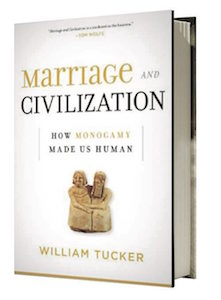Marriage and Civilization: How Monogamy Made us Human
- BARBARA KAY
Christianity, in its adamant opposition to polygamy, was "the most powerful force for implementing monogamy in Western Civilization." And immense good has come from that contribution.
 We may reasonably infer from the fact that the Biblical Garden of Eden was presided over by one man and one woman that the Hebrew God considered monogamy the norm between the sexes.
We may reasonably infer from the fact that the Biblical Garden of Eden was presided over by one man and one woman that the Hebrew God considered monogamy the norm between the sexes.
Yet Abraham and his descendants practiced polygamy, the default marriage paradigm for 75 per cent of all recorded human cultures.
We have Athens and Jesus to thank for monogamy as the marriage paradigm the West takes for granted. Athens was not only the first democracy, it was the first society to insist on monogamy and shame those who divorced. And, also according to renaissance-man journalist William Tucker, author of Marriage and Civilization: How monogamy made us human, Christianity, in its adamant opposition to polygamy, was "the most powerful force for implementing monogamy in Western Civilization."
All societies are imperfect, but the least imperfect societies, according to Tucker, and those most likely to war only intermittently rather than continuously, practice monogamy.
By "optimiz(ing) everyone's individual outcome in a way that maintains the integrity of the entire society" rather than maximizing the outcomes of the high-status few, as with polygamy, monogamy creates an environment of trust where human endeavours flourish.
Tucker brings a persuasive body of biological, evolutionary and anthropological scholarship to bear on a recurrent theme, that the besetting weakness of polygamous societies is the inability to get on with neighbours.
"Everywhere polygamy is practiced, it creates conflict," Tucker asserts. In polygamous societies, men "spend most of their time fighting amongst themselves for access to females," and raiding neighbouring tribes for them becomes a norm ("Raids are our agriculture" is an old Arab proverb).
Our earliest ancestors were hunter-gatherers, who were monogamous as a practical division of labour, and egalitarian in the sharing of food with their community.
Not motivated to go to war over resources, they were relatively peaceful. Then agriculturalists pushed them out. With agriculture came resources, wealth and status. More wives meant more labour and higher status.
Thus, polygamy. But, "The hallmark of a polygamous society is that there is always a shortage of women." High-status men could pay the bride-price for many women, but low-status males had difficulty finding any. When alpha males can have as many women as they want, men will invariably distrust other men and obsess over women, creating an environment antithetical to unguarded collaboration.
Marriage and Civilization is the kind of book that elicits the shock of recognition, like watching a perfectly proportioned human figure emerge out of a block of marble under a sculptor's unerring chisel.
A shortage of women creates volatility in low-status men. They may — as in the Ottoman Empire, which featured harems — be turned into eunuchs or, under Wahhabist influence, be "molded into assassins and terrorists and sent off to holy war." Or — another disturbing trend i n polygamous societies — they will hunt for brides among younger and younger cohorts — i.e. the barbarism of child marriage. (One of the most interesting points Tucker makes is that in a monogamous society "the incest taboo generally extends not only to daughters but to all young women old enough to be a man's daughter.")
Whether it was early agriculturalists, nomad herders, Mongols or Mormons, virtually all polygamous societies have suffered internal violence and continually contested borders. Islamic history comes in for particularly close and — in this sensitive historical moment — provocative scrutiny. Tucker writes: "Islam, as a civilization, has proven itself incapable of living at peace with itself, or with others."
Citing the ruthless exploits of Tamerlane and Genghis Khan, Tucker says, "Historically, warrior civilizations of nomads have found sympathetic chords in Islam."
It is no coincidence, Tucker believes, that the Qur'an not only tolerates polygamy but, unlike the Bible, prescribes up to four wives as part of its sacred writ. Bolstering Tucker's claim is the fact that the Druze, a peaceful Islamic sect, and the only officially monogamous Muslims, live in harmony amongst both fellow Muslims and Israelis (Druze are the only Muslims to collectively serve, often with distinction, in the IDF).
Marriage and Civilization is the kind of book that elicits the shock of recognition, like watching a perfectly proportioned human figure emerge out of a block of marble under a sculptor's unerring chisel. Tucker says it was a decade in the making and that seems right, for there is profundity here, especially in his analysis of the Western literary canon.
The Odyssey, Tucker observes, was the world's first literary "hymn to monogamy," with the uxorious Ulysses turning down eternal life with the goddess Calypso to return to Penelope, who represents the model of wifely virtue that used to inform all monogamous societies.
Used to. Tucker's final chapters on the modern family are illuminating.
Our social elites cling to monogamy, for they instinctively know its benefits, but for ideological reasons encourage low-status men and women to practice "state polygamy," the effects of which are predictably deleterious for men, women and children.
If you are interested in cultures and how they evolve — and dissolve — you must read this original and intellectually groundbreaking book.
 This is Meaghen Gonzalez, Editor of CERC. I hope you appreciated this piece. We curate these articles especially for believers like you.
This is Meaghen Gonzalez, Editor of CERC. I hope you appreciated this piece. We curate these articles especially for believers like you.
Please show your appreciation by making a $3 donation. CERC is entirely reader supported.

Acknowledgement
 Barbara Kay "Monogamy for the Win." National Post, (Canada) 20 January, 2016.
Barbara Kay "Monogamy for the Win." National Post, (Canada) 20 January, 2016.
Reprinted with permission of the author, Barbara Kay, and the National Post.
The Author
 Barbara Kay is a Montreal-based writer. She has been a Comment page columnist (Wednesdays) in the National Post since September, 2003.
Barbara Kay is a Montreal-based writer. She has been a Comment page columnist (Wednesdays) in the National Post since September, 2003.




